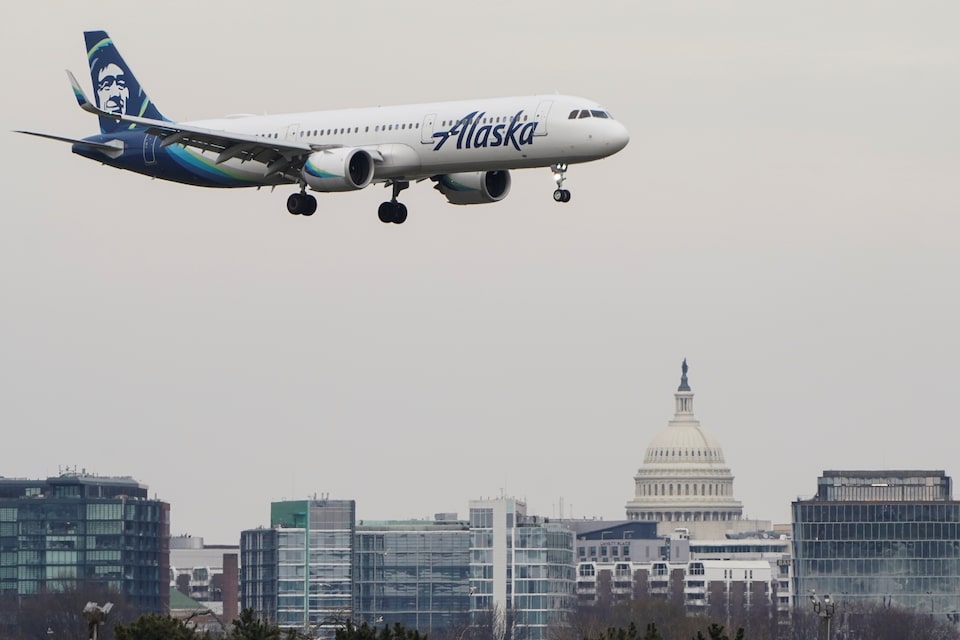An Alaska Airlines aircraft flies past the U.S. Capitol before landing at Reagan National Airport in Arlington, Virginia, U.S., January 24, 2022. REUTERS

Cars are seen at car rental companies Alamo, Enterprise, National, Avis, Europcar, Budget, Sixt and Hertz outside Paris Charles de Gaulle airport in Roissy-en-France during the outbreak of the coronavirus disease (COVID-19) in France May 19, 2020. REUTERS
Summary
- Old Dominion loses 8.5%; Avis Budget falls 7.2%
- Airline stocks also among the biggest decliners
NEW YORK/BENGALURU (Reuters) – Transportation stocks went sharply in reverse on Friday with the economic bellwether Dow Jones Transport average index (.DJT), falling more than 2.6% in its steepest daily loss since December 18 and its third consecutive decline, as investors reacted to weak economic readings and worried about tariffs.
While the transport index pared its losses by the close, most of its stocks fell for the day. Its biggest decliner was Old Dominion (ODFL.O), finishing down 8.5%. Car rental company Avis Budget (CAR.O), the second biggest loser, fell 7.2%.
Airlines were among the biggest decliners, with Alaska Air Group (ALK.N), falling 6.9%, United Airlines (UAL.O), opens new tab dropping 6.4% and Delta Air Lines (DAL.N),ending down 5.9%. Also among the laggards were FedEx (FDX.N), which lost 5.3%, and Kirby Corp (KEX.N) down 3%.
Earlier, S&P Global data showed U.S. business activity nearly stalling in February and tumbling to a nearly 17-month low, with fears over import tariffs and deep federal government spending cuts, erasing soaring sentiment after the November U.S. election.
Also on Friday a University of Michigan survey showed U.S. consumer sentiment dropping more than expected in February to a 15-month low with inflation expectations jumping as households worried about plans for steep, broad-based tariffs.
And the data followed a downbeat forecast on Thursday from the world’s biggest retailer, Walmart (WMT.N), as it cited the need for caution in navigating an uncertain geopolitical landscape, sending its shares and the broader market down.
As for the drivers for the transport declines, Robert Pavlik, senior portfolio manager at Dakota Wealth, pointed to questions about the health of the economy and concerns about factors such as tariffs.
President Donald Trump in his first month in office slapped an additional 10% tariff on Chinese imports. While a 25% levy on imports from Mexico and Canada was suspended until March, this month he raised tariffs on steel and aluminum imports to 25%.
And on Tuesday Trump said he would impose auto tariffs “in the neighborhood of 25%” and similar duties on semiconductors and pharmaceutical imports.
The worry is that threats or implementation of tariffs will boost prices and hurt demand for goods and in turn the carriage of these goods by freight companies and home package deliverers.
“When one is to contemplate the impact of what will be shipped from other countries to the United States if, in fact, the new administration moves forward with tariffs, there might be a decrease of international deliveries and perhaps an increase of domestic delivery,” said Art Hogan, chief market strategist at B Riley Wealth.
The broader market also reflected a risk-off mood on Friday with the three major Wall Street indexes losing more than 1%. The Nasdaq was leading losses with a 2.2% drop.
Reporting By Sinéad Carew; Editing by Will Dunham





